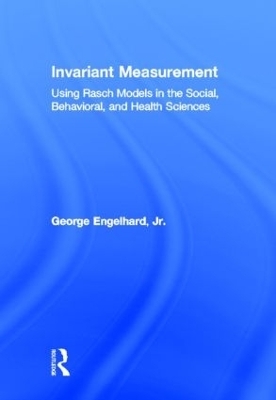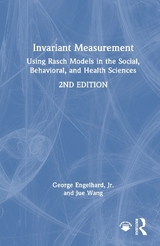
Invariant Measurement
Routledge (Verlag)
978-0-415-87122-8 (ISBN)
Written with students in mind, the manuscript was class tested to help maximize accessibility. Chapters open with an introduction and close with a summary and discussion. Numerous examples and exercises demonstrate the main issues addressed in each chapter. Key terms are defined when first introduced and in an end-of-text glossary. All of the book’s analyses were conducted with the Facets program. The data sets used in the book, sample syntax files for running the Facets program, Excel files for creating item and person response functions, links to related websites, and other material are available at www.GeorgeEngelhard.com.
Highlights include:
A strong philosophical and methodological approach to measurement in the human sciences
Demonstrations of how measurement problems can be addressed using invariant measurement
Practical illustrations of how to create and evaluate scales using invariant measurement
A history of measurement based on test-score and scaling traditions
Previously unpublished work in analyzing rating data, the detection and measurement of rater errors, and the evaluation of rater accuracy
A review of estimation methods, model-data fit, indices used to evaluate the quality of rater-mediated assessments, rater error and bias, and rater accuracy.
Intended as a supplementary text for graduate or advanced undergraduate courses on measurement or test theory, item response theory, scaling theory, psychometrics, advanced measurement techniques, research methods, or evaluation research taught in education, psychology, and the social and health sciences, the book also appeals to practitioners and researchers in these fields who develop or use scales and instruments. Only a basic mathematical level is required including a basic course in statistic.
George Engelhard, Jr. is a professor of educational measurement and policy in the Division of Educational Studies at Emory University. Professor Engelhard received his Ph.D. from The University of Chicago in the MESA (measurement, evaluation, and statistical analysis) program. Professor Engelhard is co-editor of four books, and the author or co-author of over 125 journal articles, book chapters, and monographs. He serves on national technical advisory committees on educational measurement and policy for several states including Georgia, Louisiana, Michigan, New Jersey, Ohio, Pennsylvania, and Washington. He is a past president of the Georgia Educational Research Association. Professor Engelhard has received numerous awards and fellowships including a National Academy of Education/Spencer Foundation Fellowship Award, a Lilly Post-Doctoral Teaching Award, and a Writing Across the Curriculum Project Award. He is a fellow of the American Educational Research Association.
Part I. Introduction 1. Introduction and overview. Part II. Conceptual and theoretical issues. 2. Invariant measurement. 3. Rasch models. 4. Researcher-Constructed Measures. 5. An Historical and Comparative Perspective on Research Traditions in Measurement. 6. The Quest for Invariant Measurement within the Scaling Tradition. Part III. Technical Issues. 7. Methods of Estimation for the Dichotomous Rasch Model. 8. Model-Data Fit for the Dichotomous Rasch Model. Part IV: Assessments with raters: Rater-invariant measurement. 9. Rater-mediated assessments: Conceptual framework. 10. Evaluating the quality of rater-mediated assessments I: Indices of rater errors and systematic biases. 11. Evaluating the quality of rater-mediated assessments II: Indices of rater accuracy. Part V: Final Word.
| Erscheint lt. Verlag | 12.2.2013 |
|---|---|
| Zusatzinfo | 60 Tables, black and white; 56 Line drawings, black and white |
| Verlagsort | London |
| Sprache | englisch |
| Maße | 152 x 229 mm |
| Gewicht | 544 g |
| Themenwelt | Geisteswissenschaften ► Psychologie ► Allgemeine Psychologie |
| Geisteswissenschaften ► Psychologie ► Test in der Psychologie | |
| Mathematik / Informatik ► Mathematik | |
| Studium ► Querschnittsbereiche ► Epidemiologie / Med. Biometrie | |
| Sozialwissenschaften ► Pädagogik | |
| ISBN-10 | 0-415-87122-0 / 0415871220 |
| ISBN-13 | 978-0-415-87122-8 / 9780415871228 |
| Zustand | Neuware |
| Informationen gemäß Produktsicherheitsverordnung (GPSR) | |
| Haben Sie eine Frage zum Produkt? |
aus dem Bereich



